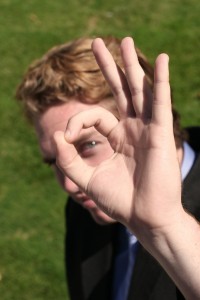What Causes Them & How to Treat?
 Seeing a bright red patch of blood in the white part of your eye can be scary, but it usually looks much worse than it is. Typically, this is the result of a subconjunctival hemorrhage, more commonly known as a burst blood vessel in the eye.
Seeing a bright red patch of blood in the white part of your eye can be scary, but it usually looks much worse than it is. Typically, this is the result of a subconjunctival hemorrhage, more commonly known as a burst blood vessel in the eye.
Usually, you won’t notice a burst blood vessel in your eye until you look in the mirror and see a red spot on your eye. Sometimes you might feel a scratchy, irritated feeling on your eyeball afterward, but the condition causes no outright pain or disruption to your vision. In fact, burst blood vessels in the eye are ordinarily completely harmless and will go away on their own within 10-14 days without treatment.
What causes them in the first place?
They can occur without warning and with seemingly no known cause, however, the tiny blood vessels in your eye are fragile and certain routine activities can also cause them to break. This includes:
- Strong coughing or sneezing
- Heavy lifting or straining (such as weight lifting)
- Vomiting
- Rubbing your eyes or inserting contact lenses
- Crying
- Trauma or injury to the eye or head
If you take certain blood-thinning medications and supplements, such as warfarin (Coumadin), aspirin, vitamin E or fish oil (in high doses), these can also increase your risk of a burst blood vessel in your eye, as can an eye infection, diabetes or high blood pressure. In rare cases, herbal supplements like ginkgo biloba, ginger or St. John’s wort may also increase the risk.
The pooling of blood in your eye occurs because the conjunctiva (the transparent membrane that covers the white of your eye) is unable to absorb it quickly. As it heals, the spot will likely change from red to orange to yellow, similar to the way a minor skin bruise changes color as it goes away. Most burst blood vessels in the eye require no treatment and will heal on their own with no lasting effects. However, if you experience them frequently, talk to your health care provider to rule out a potential bleeding disorder or blood pressure problem.
As the area heals, avoid rubbing your eye, which can cause bleeding to resume (similar to a nosebleed that may start bleeding again if you blow your nose). Antioxidant dietary supplements such as vitamin C, grape seed extract and pycnogenol (French maritime pine bark extract) may help strengthen the blood vessels in your eyes to help prevent the problem from recurring in the future.
For more information on how to protect, support and enhance your eye and vision health, be sure to read How NOT to Go Blind as You Age … it contains crucial tips to greatly reduce your risk of vision loss from the leading cause of permanent blindness among Americans.

